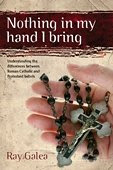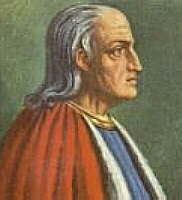How can a person be saved? - Pt 1
 This week Carmelina has written 2 posts again so make sure you come back and read Part 2 later in the week.
This week Carmelina has written 2 posts again so make sure you come back and read Part 2 later in the week.
It’s been great to see some interaction happening. Please consider sending in a comment and sharing your experiences or thoughts. It’s a wonderful encouragement to every one who reads the blog (and to me too!).
In Ray’s book he explains that the fundamental flaw in Roman Catholicism is the role it places on human activity in salvation. As Ray says in the book, “… Catholicism seems to have an unrelenting need to find a place for the human; to insert the Church and its rituals and works into God’s plan of salvation.” (p.99) Roman Catholicism says that if we want to be saved, we can’t do it without the Pope, the Roman Catholic Church and good works.
So the issue I’d like us to think about this week, is how can a person be saved? What has to happen? To help us dig deeper, I’d like to look at this issue from a slightly different angle. I’d like us to think about ‘how does what Jesus achieved on the cross become ours?’ This is a question that goes to the heart of the most fundamental differences between Roman Catholicism and Protestantism. This week in my first post, I’ll explain the Roman Catholic answer and compare it to the Bible’s answer. In the second, I’ll look at the implications of the Bible’s teachings.
 Both Roman Catholicism and those who have aligned themselves with Protestantism believe that when Jesus died on the cross, He won benefits (sometimes called grace or merits) which, when given to people, are able to save them from God’s judgment. This idea of Jesus having rewards/benefits/grace/merits started with a man called
Anselm. Because all people have sinned, Anselm explained that all people owe God a debt that they can never repay. Jesus, on the other hand lived a perfect life and never owed God a debt. But, Jesus willingly came to earth, lived a perfect life as a human being and then gave his life as the sacrificial payment for the sins of all people. God has accepted Jesus’ perfect life and death as the punishment for people’s sins and so Jesus now has rewards/benefits/merits/grace which He is able to give to people (also called ‘the treasury of merit’). These ‘benefits’ include forgiveness of sins, a place in heaven, eternal life, friendship with God and so on (they are all one package).
Both Roman Catholicism and those who have aligned themselves with Protestantism believe that when Jesus died on the cross, He won benefits (sometimes called grace or merits) which, when given to people, are able to save them from God’s judgment. This idea of Jesus having rewards/benefits/grace/merits started with a man called
Anselm. Because all people have sinned, Anselm explained that all people owe God a debt that they can never repay. Jesus, on the other hand lived a perfect life and never owed God a debt. But, Jesus willingly came to earth, lived a perfect life as a human being and then gave his life as the sacrificial payment for the sins of all people. God has accepted Jesus’ perfect life and death as the punishment for people’s sins and so Jesus now has rewards/benefits/merits/grace which He is able to give to people (also called ‘the treasury of merit’). These ‘benefits’ include forgiveness of sins, a place in heaven, eternal life, friendship with God and so on (they are all one package).
The only problem is that Anselm didn’t explain how Jesus’ ‘benefits’ are given to us. The answer to this question is the fundamental difference between Roman Catholicism and what the Bible teaches.
Roman Catholicism, as you will have seen in this month’s book, teaches that the ‘benefits’ of Jesus are given to the Roman Catholic Church and the Pope. God has given the benefits that Jesus won on the cross to the Church and to the Pope and the church gives it to people via the sacraments – that is, through baptism, the mass (communion), confession, the last rites and so on. You can also receive the benefits or grace of Jesus through things like indulgences. On this issue, have a look at the World Youth Day website info on Plenary Indulgences and note what is said under the heading “What is a Plenary Indulgence?:
The Church, as the minister of Christ’s redemption, dispenses graces – including indulgences – from the treasury of the gifts given by Christ…and makes them available to those seeking them with sincere heart. Indulgences are not magical…Those in Heaven don’t need our help, but those in Purgatory do, so we can receive an indulgence for ourselves or for them.”That’s why a Roman Catholic person has to make sure they keep getting bits of the rewards that Jesus won. Every time you receive a sacrament, every time you receive an indulgence, you receive a bit more of the grace of Jesus. Hopefully, this means you’re edging your way closer and closer to heaven.
But what does the Bible say? The simple answer is that the Bible says we can get all the benefits Jesus won at the cross by being united to Christ. Not through the sacraments or any other ritual, but personally. We can be personally joined to Jesus. And when we’re united to Jesus, he gives us all the benefits he won.
Let me explain the Bible’s teaching in 3 steps:
1. Christians are united to Jesus. Like a husband and a wife are united, like a head and a body are united: “For the husband is the head of the wife as Christ is the head of the Church, his body of which he is the Saviour.” (Ephesians 5:2 - NIV) It’s like when Jeff and I got married, I was united to him and so I got all his possessions. So when you’re united to Christ, you get all his possessions and this includes the benefits God has given to Jesus. You can also see it in Ephesians 1:3 “Praise be to the God and Father of our Lord Jesus Christ. He has blessed us in our union with Christ, by giving us every spiritual gift.”
2. The next logical question is – how do we get united to Jesus? In other words, how can we come into this relationship with Jesus? The Bible’s answer is by faith. You have to rely or trust in what Jesus has done for you. You have to say to God, “I rely on Jesus, please give me all his benefits.” You can see this in verses like “This righteousness from God comes through faith in Jesus Christ to all who believe” (Romans 3:22) or “For it is by grace you have been saved, through faith.” (Ephesians 2:8).
3. How does faith bring us into union with Jesus? Well it’s all got to do with the Holy Spirit. In the Old Testament, God promised that He would one day give His Holy Spirit to His people and they would be able to be saved. (Joel 2:28 and 32). And that’s exactly what happened. After Jesus rose from the dead and ascended to the right hand of God, He sent out His Spirit so that all who call on the name of Jesus will be saved. (Acts 1:6-10 and 2:1-39). The Holy Spirit brings the benefits of Jesus to us. This can best be explained in 3 steps:
(i) First of all, it’s the Holy Spirit who gives us faith in Jesus: “… no one can say “Jesus is Lord, except by the Holy Spirit.” (1 Corinthians 12:3)
(ii) when we put our faith in Jesus, we receive the Holy Spirit: “Peter replied, “Repent and be baptised, everyone of you, in the name of Jesus Christ for the forgiveness of your sins. And you will receive the gift of the Holy Spirit.” (Acts 2:38) and
(iii) thirdly, when we receive the gift of the Holy Spirit, we receive Jesus: “And you also were included in Christ when you heard the word of truth, the gospel of your salvation. Having believed, you were marked in him with a seal, the promised Holy Spirit, who is a deposit guaranteeing our inheritance until the redemption of those who are God’s possession.” (Ephesians 1:13-14) What does this verse mean? It means that when we believe in Jesus (when we put our faith in Jesus), we’re “included in Christ.” And when we’re included or united to Christ, the Holy Spirit ‘guarantees’ that all the benefits of Christ will be ours.
The Bible says all of this in other ways – The Holy Spirit brings Christ to our hearts (Ephesians 3:16-17) and being united to Christ is the same as having fellowship with the Holy Spirit (Philippians 2:1 – see also Titus 3:4-7 and 1 Corinthians 6:11).
 This truth was one of the great rediscoveries of the Reformation. Roman Catholicism teaches that the church and the Pope have control of what Jesus has done. They are like the bank who is able to dish out the goods – through sacraments and indulgences. But when people like Martin Luther and John Calvin looked at the Bible, they saw a completely different way of receiving the benefits of Jesus. They saw that what Jesus did on the cross can be applied to us personally – directly – straight from God to us. In fact, it was John Calvin who made clear that all this is the work of the Holy Spirit. Calvin wrote “The Holy Spirit is the bond by which Christ effectually unites us to himself.”
This truth was one of the great rediscoveries of the Reformation. Roman Catholicism teaches that the church and the Pope have control of what Jesus has done. They are like the bank who is able to dish out the goods – through sacraments and indulgences. But when people like Martin Luther and John Calvin looked at the Bible, they saw a completely different way of receiving the benefits of Jesus. They saw that what Jesus did on the cross can be applied to us personally – directly – straight from God to us. In fact, it was John Calvin who made clear that all this is the work of the Holy Spirit. Calvin wrote “The Holy Spirit is the bond by which Christ effectually unites us to himself.”
I know it’s required some concentration to get through this stuff (not light hearted blog info is it?!). But the implications are enormous. To get you thinking, what do you think are the implications? Here are a few hints:
1. what are the implications for the role of the church, the Pope, priests?
2. what place is there for our own good works in saving us? (an issue we’ll explore in more detail next week)
3. what are the implications for assurance (ie. whether we can be sure we are saved)?
Please write in. I look forward to some discussion.
Happy thinking …
Carmelina
Pics are of Anslem and John Calvin.